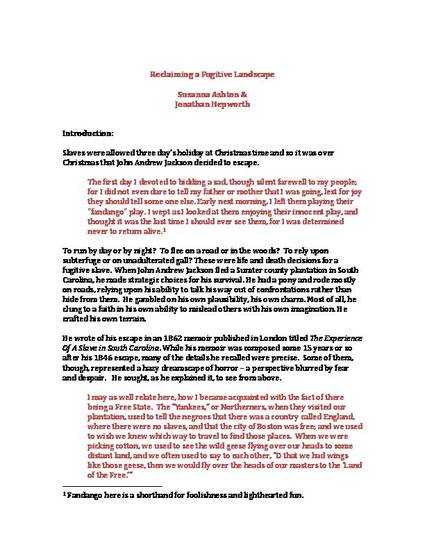
Slaves were allowed three day’s holiday at Christmas time and so it was over Christmas that John Andrew Jackson decided to escape.
The first day I devoted to bidding a sad, though silent farewell to my people; for I did not even dare to tell my father or mother that I was going, lest for joy they should tell some one else. Early next morning, I left them playing their "fandango" play. I wept as I looked at them enjoying their innocent play, and thought it was the last time I should ever see them, for I was determined never to return alive.1
To run by day or by night? To flee on a road or in the woods? To rely upon subterfuge or on unadulterated gall? These were life and death decisions for a fugitive slave. When John Andrew Jackson fled a Sumter county plantation in South Carolina, he made strategic choices for his survival. He had a pony and rode mostly on roads, relying upon his ability to talk his way out of confrontations rather than hide from them. He gambled on his own plausibility, his own charm. Most of all, he clung to a faith in his own ability to mislead others with his own imagination. He crafted his own terrain.
He wrote of his escape in an 1862 memoir published in London titled The Experience Of A Slave in South Carolina. While his memoir was composed some 15 years or so after his 1846 escape, many of the details he recalled were precise. Some of them, though, represented a hazy dreamscape of horror – a perspective blurred by fear and despair. He sought, as he explained it, to see from above.
I may as well relate here, how I became acquainted with the fact of there being a Free State. The “Yankees,” or Northerners, when they visited our plantation, used to tell the negroes that there was a country called England, where there were no slaves, and that the city of Boston was free; and we used to wish we knew which way to travel to find those places. When we were picking cotton, we used to see the wild geese flying over our heads to some distant land, and we often used to say to each other, “O that we had wings like those geese, then we would fly over the heads of our masters to the ‘Land of the Free.’”
Available at: http://works.bepress.com/susanna_ashton/10/
